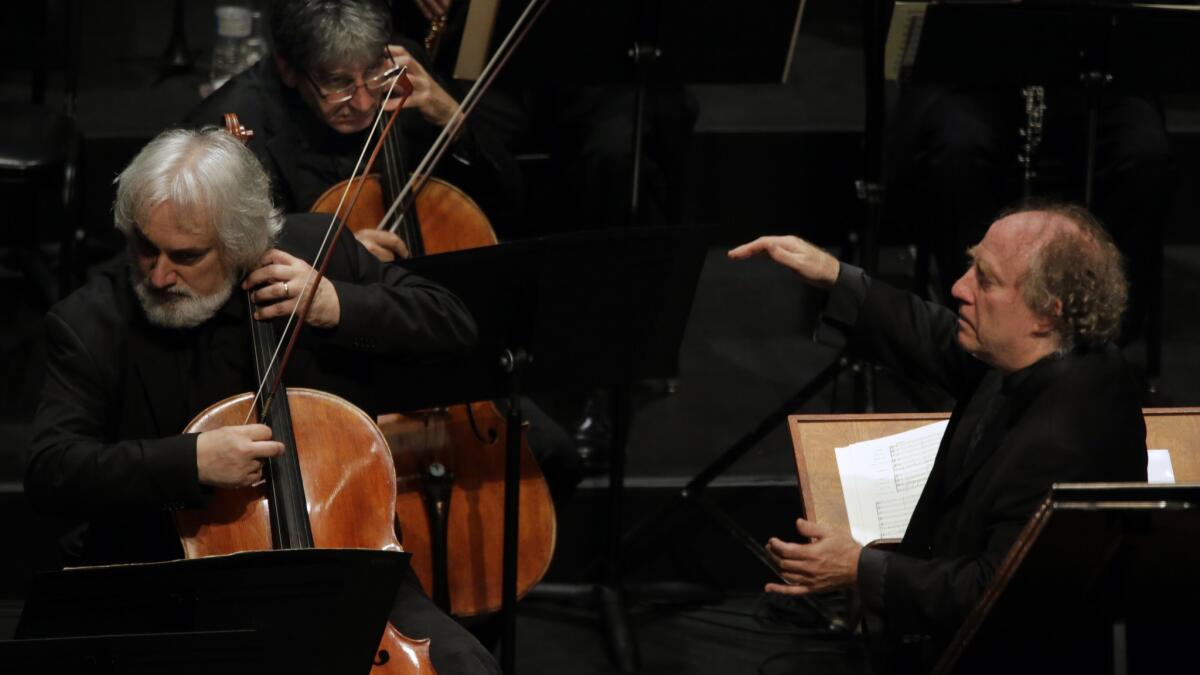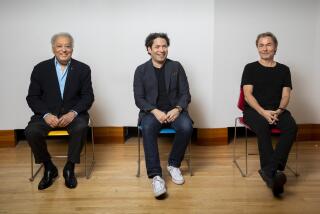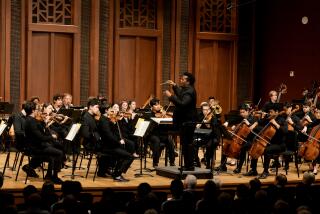Review: L.A. Chamber Orchestra ending season on a sunny note

Jeffrey Kahane conducts the Los Angles Chamber Orchestra.
If what you hear is what you get, the Los Angeles Chamber Orchestra is ending its season in the best of cheer. Major keys prevailed Sunday night at Royce Hall, where the main music was Mozart’s ravishing Piano Concerto No. 21 in the optimistic key of C Major and Mendelssohn’s gallivanting “Italian” Symphony, happily ensconced in sunny A Major.
All news was good news. Music director Jeffrey Kahane began by praising the players to the audience for having at their previous Royce Hall concert played Mozart’s “Jupiter” Symphony without a conductor when the guest conductor, Joshua Weilerstein, took ill and couldn’t go on after intermission.
This time around, Kahane might have lost his soloist. Jonathan Biss is recovering from a hand injury and two weeks ago canceled what was to have been an appearance with the New York Philharmonic this week. But LACO didn’t need advance notice because Kahane happens to be an inspired Mozart pianist, and he could simply play it himself from the keyboard if necessary. That is, in fact, what he will do Wednesday, when the orchestra performs in Santa Barbara. Kahane will also conduct Mozart’s C-Major concerto from the keyboard with the New York Philharmonic next month.
It wasn’t necessary Sunday. Biss is healing rapidly and was his usual fluent self.
A dark cloud might have been “respirator.” For the 14th time, Kahane has ended a LACO season with a premiere, part of the ensemble’s “Sound Investment” series, in which audience members are invited to make contributions toward a new work. This year the composer was Ted Hearne, who recently exchanged the Brooklyn scene for a teaching position at USC.
As a young child, Hearne suffered from severe asthma, and “respirator” was inspired by memories of the sound of his small wheezing lungs and arrhythmic heartbeat that he heard inside a respirator. Orchestra players are asked to gasp, whine and rattle on their instruments. The gradual appearance of pitches is the representation of the respirator’s healing oxygen in action.
A sonic portrait of asthma is not necessarily enticing concert music outside of programs by, say, the Los Angeles Doctors Symphony. But the sounds, while not new to experimental music, have conspicuous character and their mellowing out into charismatic melodic shapes signal hope, as does a more regulated percussive pulse.
Raspy instrumental sounds do return at the end, but they become natural, no longer illness sonified. A further advantage is that Hearne has created a rare example of a cough-proof new music that might prove useful if the 14-minute score ever finds a less-sympathetic audience than it enjoyed in Royce.
Kahane had joked at the beginning of the evening that after the conductor-less “Jupiter,” the orchestra may not much need him anymore but has graciously let him go on. In fact, he made himself essential with a crisp attention to sound and pulse in the Hearne, to eloquence and fun in the Mozart and to exuberance in Mendelssohn’s symphony.
Biss is a soloist who phrases like a musical insider, looking for hidden meaning of a gesture, and Kahane gave him an operatic frame in which the pianist could do his exploration. After several curtain calls, Kahane grabbed Biss as he was walking off stage and brought him back for an encore, “Abschied” from Schumann’s “Waldszenen,” played with rosy tone.
There was also a tribute to Richard Todd, the principal horn who is retiring after 35 years in the orchestra. Kahane preceded Mendelssohn’s “Italian” symphony with Nocturne and Scherzo from the composer’s incidental music to “A Midsummer Night’s Dream,” the horn-rich Nocturne allowing Todd a final bow.
And yet I wondered if all that good cheer, hail fellow well met was not overdone. The playing was fresh, but most of the music wasn’t. The works by Mozart and Mendelssohn heard Sunday have been programmed by LACO so often that one or another of them was given on average of every other season since the orchestra was founded in 1968.
The future, furthermore, is a question mark. The orchestra is on a search for a managing director (Rachel Fine left earlier this year) and a music director (Kahane has announced that he will not renew after the 2016-17 season, which will be his 20th). The only thing certain is that the ensemble is in excellent shape and one guest conductor this season, Karina Canellakis, seemed like she could make a promising music director candidate.
More to Read
The biggest entertainment stories
Get our big stories about Hollywood, film, television, music, arts, culture and more right in your inbox as soon as they publish.
You may occasionally receive promotional content from the Los Angeles Times.







